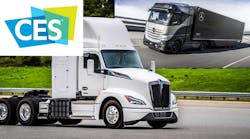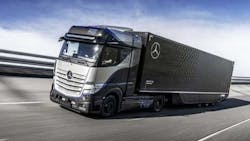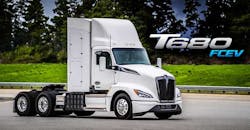Hydrogen Tech Led Heavy-Duty Truck Innovation at CES 2024
Check out Electronic Design's coverage of CES 2024.
Global energy consumption has doubled in the past 50 years and continues to grow by around 2% each year. Fossil fuels currently account for some 80% of global energy consumption. In view of climate change, developing a compact, reliable, safe, and cost-effective alternative energy source is a major challenge.
Countries and industries around the world are investing in hydrogen technologies as one possible pillar of future mobility. The U.S. government, for example, is pushing ahead with the development of H2 infrastructure and investing $7 billion in the construction of hydrogen hubs.
While most automakers are betting on electric vehicles, a few carmakers and especially those who manufacture heavy-duty commercial trucks are more inclined to work on fuel-cell electric vehicles (FCEVs) powered by hydrogen. With Bosch, Hyundai, Bosch, Mercedes-Benz, PACCAR, and others leading the way, this year’s recently completed CES was crowded with all types of hydrogen-powered vehicles.
While the energy per mass of hydrogen is substantially greater than most other fuels, its energy by volume is much less than liquid fuels like gasoline. According to the U.S. Department of Energy, for a 300-mile driving range, an FCEV will need about 5 kg of hydrogen. At 700 bar (~10,000 psi), a storage system would have a volume of about 200 liters or 3X to 4X the volume of gasoline tanks typically found in cars today.
EV batteries are much heavier than fuel cells, and they take hours to fully recharge. Refueling a hydrogen-powered vehicle, on the other hand, is about as time-consuming as filling up a conventional gas tank.
Evolution of Daimler's GenH2
Daimler Truck recently announced its GenH2 electric semi. GenH2’s motors draw power from a fuel cell that runs on liquid hydrogen. Daimler has said the vehicle will appear on German roads by mid-2024 when Amazon, Air Products, INEOS, Holcim, and Wiedmann & Winz will take part in the first customer trials with Daimler fuel-cell trucks (the Mercedes-Benz Group is the largest individual shareholder of Daimler Truck Holding AG). The vehicles will be refueled at designated public liquid-hydrogen filling stations in Wörth am Rhein and in the Duisburg area.
Key performance figures of the GenH2 Truck are comparable with conventional long-haul trucks. The fuel-cell system of the GenH2 Truck, according to the company, delivers 300 kW. The truck also has a battery that can add an additional 400 kW in short bursts for quick acceleration and hill climbing. The battery’s 70-kWh storage capacity is sufficient, according to the company, for recycling kinetic energy that’s converted to electric charge via regenerative braking.
The Mercedes-Benz GenH2 Trucks that will be used in the first customer trials will offer a payload of approximately 25 tons at a gross combination weight (GCW) of 40 tons. Two special liquid-hydrogen tanks and a specially developed fuel-cell system enable this payload and range.
The two stainless-steel liquid-hydrogen tanks of the GenH2 Truck have a high storage capacity of 88 kg (44 kg each), which make them well-suited for covering long distances. The stainless-steel tank system consists of two tubes, one within the other, and they’re connected to each other as well as vacuum insulated.
A core element of the operating strategy of the fuel-cell and battery system is a cooling and heating system that keeps all components at a suitable operating temperature, thus ensuring maximum durability. In a pre-series version, the two electric motors are designed for a total of 2 × 230-kW continuous power and 2 × 330-kW maximum power.
Direct Hydrogen Combustion
At CES, hydrogen fuel-cell manufacturer Bosch announced it will make an engine that can combust hydrogen, avoiding the stage where the energy gets converted to electricity and stored in a battery. When powered by green hydrogen, this engine is practically carbon-neutral. The H2 engine is set to debut this year.
Tanja Rückert, member of the board of management of Robert Bosch GmbH, noted, “To help us meet our global energy needs in a resource-efficient way, Bosch is focusing on digitalization, electrification, and hydrogen.”
Bosch is investing extensively in technologies along the hydrogen value chain. The focus is currently on the mobile fuel cell, which recently went into volume production in Stuttgart. Bosch said it has already received its first orders from truck manufacturers in Europe, the U.S., and China.
PACCAR, a global technology leader in the design, manufacture, and customer support of light-, medium-, and heavy-duty trucks under the Kenworth, Peterbilt, and DAF nameplates, is leveraging next-generation hydrogen fuel-cell technology developed in partnership with Toyota Motor North America Inc.
The companies expanded their partnership to develop and commercialize the technology in Kenworth T680 and Peterbilt Model 579 Class 8 trucks. The powertrain was recently awarded Zero Emission Powertrain certification by the California Air Resources Board. The Kenworth T680 FCEV was on display at CES. And the hydrogen-fuel-cell-powered Peterbilt Model 579 offers zero-emissions heavy-duty operations with up to a 450-mile range, an 82,000-lb. max gross combination weight rating, and refueling times that are consistent with traditional diesel trucks.
To date, PACCAR said it has received more than 150 paid deposits for Kenworth and Peterbilt FCEVs, with customer deliveries commencing in 2025.
“PACCAR is developing the transportation industry’s most important technologies. These include industry-leading battery electric and hydrogen-fuel-cell electric vehicles that help customers operate with the lowest emissions and outstanding efficiency,” said John Rich, PACCAR senior vice president and CEO. “We are investing in multiple zero-emissions technologies in order to have the right trucks and transportation solutions for our customers.”
Organic Waste into Clean Hydrogen
Korean automaker Hyundai has spent decades working on hydrogen-powered vehicles. At CES, José Muñoz, president and global chief operating officer of Hyundai Motor Co., said the tech will play a “prominent role” in the Hyundai Group’s attempt to become a carbon-neutral company by 2050. “It’s already technologically feasible, and it will eventually make sense economically, too.”
For example, Chang-Hwan Kim, who oversees fuel-cell and battery development at Hyundai, noted that Hyundai is working to turn “sewage sludge and other forms of organic waste” into clean hydrogen.


